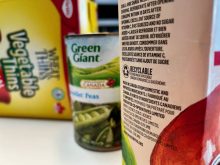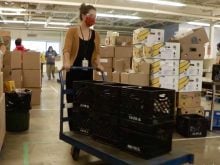If Ottawa really wants to boost Canadian agri-food exports, the country needs to enhance its reputation as a supplier of sustainably produced safe food.
That’s according to Evan Fraser, the Canada research chair in global food security at the University of Guelph.
The Barton report of 2016 and followup work by various agri-food groups have boosted recognition of the sector’s economic importance, he told the Senate agriculture committee, resulting in an emerging consensus.
“We need to establish a pre-competitive Canada food brand that would demonstrate to our trading partners that when they buy Canadian food, they are buying the world’s most trusted, safe and sustainable,” he told the committee.
Read Also

Trade uncertainty, tariffs weigh on Canadian beef sector as market access shifts
Manitoba’s beef cattle producers heard more about the growing uncertainty they face as U.S. tariffs, and shifting trade opportunities, reshape their market.
Achieving that status will involve being a leader in standards and developing information and technology systems such as blockchain that held steward and safeguard brand Canada, he said.
“Then we need to market our brand so that the Canada food brand becomes globally recognized and synonymous with safe and sustainable,” Fraser said.
To accomplish those goals involves building on the reputation of Canada’s food regulatory system to codify and solidify what safety, trust and sustainability mean, he said. While significant parts of the food chain have made progress, many of these systems are fragmented and we don’t have a full value chain sustainability assurance system, he added.
The Canadian Agri-Food Sustainability Initiative could set safety and sustainability standards that should be included in the national food policy council under development by the Agriculture and Health departments. Canada also needs information technology systems to ensure that Canadian food systems are transparent and cybersecure, Fraser said.
“This really moves our discussion into the realm of cloud computing, cybersecurity and blockchain,” he said.
When these steps are reached, Canada needs to ensure that we are rewarded by our international competitors for doing these things,” he said.
“That’s where a Canada brand comes into play to reach consumers around the world looking for the kind of food Canada is supplying,” he said.
The federal government can play a key role in establishing the Canada brand with trade missions, he said.
“We can build a Canada brand that will be used to demonstrate to consumers around the world that when they buy Canadian food, they are feeding themselves and their families the safest and most sustainable food that the world has to offer,” he said.
Good examples of trusted food products are identity-preserved soybeans, a non-GMO edible soybean for which Ontario soybean producers have created a high value-added market, specifically feeding the Japanese consumers’ demand for things like soybeans, edamame and miso, he said.
“There they have created this identity-preserved system which allows that consumer a clear line back to the farmer and an understanding of what happened at each step of the way,” he said. “That is what trusted is.”
Work remains to be done on improving our sustainable reputation as a way of demonstrating to consumers all over the world that when they buy Canadian food, they are buying something that is a bit special, he said.
One positive step would be the creation of a national food policy council with the “mandate to codify existing sustainability and safety standards and ensure that they are the most rigorous in the world,” he said.
The council or the Canadian Agricultural Partnership could establish national standards for pooling and aggregating agricultural data, he said.
“There is a very strong role for federal leadership to help ensure that our data is handled in a way that is safe, transparent and cybersecure,” he said.
While Canada enjoys a good reputation that can be built on, it cannot be taken for granted.
“I’m nervous that we don’t have an ability to protect that,” Fraser said. “In terms of global appearances and global perceptions, we are far ahead.”
Animal agriculture is in for some fundamental changes as people consume less meat, he said. Livestock production will decrease as a portion of overall diet, both for sustainability, health and simple market reasons, all tied together. Industry is bringing on new alternatives that consumers are finding really exciting. He cited the new-branded President’s Choice cricket protein, where demand exceeds supply.
“The industry as a whole has to realize that its total volume is going to shrink, but its profit levels can be maintained if it adopts a higher value-added product, by marketing as organic, free range or free from,” he said.















